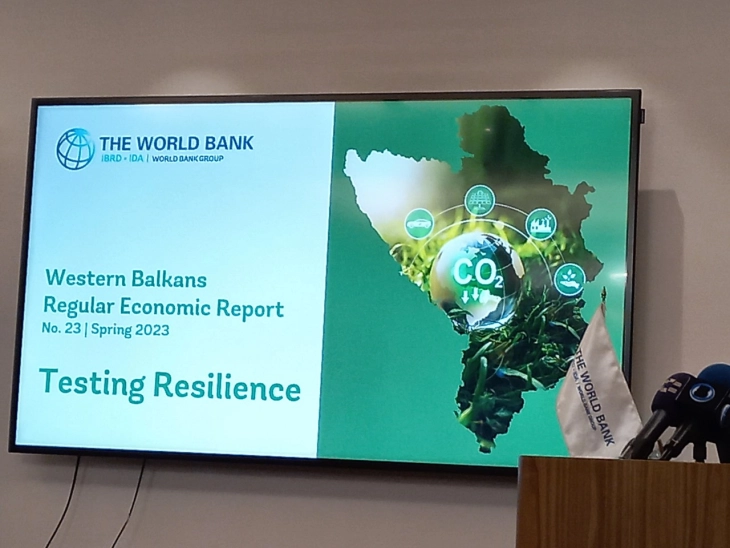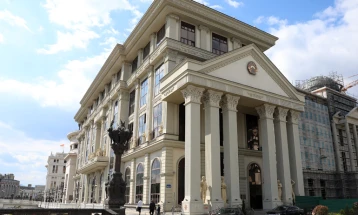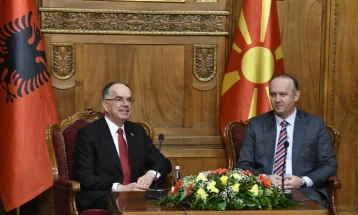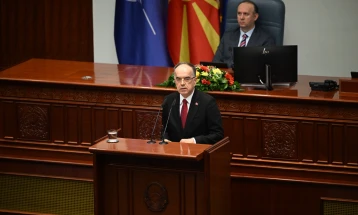World Bank forecasts North Macedonia’s economy to grow slightly from 2.1% in 2022 to 2.4% in 2023
- The economies of North Macedonia, Albania, Bosnia & Herzegovina, Montenegro, Kosovo, and Serbia have surpassed pre-pandemic levels despite fallout from Russia’s invasion of Ukraine, higher energy and food prices, unfavorable weather conditions, tightening financial conditions, and significant uncertainty, according to the latest Western Balkans Regular Economic Report released today.

Skopje, 25 April 2023 (MIA) - The economies of North Macedonia, Albania, Bosnia & Herzegovina, Montenegro, Kosovo, and Serbia have surpassed pre-pandemic levels despite fallout from Russia’s invasion of Ukraine, higher energy and food prices, unfavorable weather conditions, tightening financial conditions, and significant uncertainty, according to the latest Western Balkans Regular Economic Report released today.
North Macedonia’s economy is forecast to grow slightly from 2.1% in 2022 to 2.4% in 2023, it was highlighted at today's press conference in Skopje where the report was presented.
Despite a brisk post-pandemic recovery, the ongoing cost-of-living crisis—particularly high food and energy prices—has depressed growth in the country and pushed inflation to a two-decade high across the region, stretching public finances amidst a rise in borrowing costs. With commodity prices expected to decline over the next two years, the inflation rate is projected to decelerate to 9.1 percent in 2023 and further to 3 percent in 2024.
Economic growth is projected to moderately accelerate over the medium term. Given scarce fiscal space, government support to shield the economy from high energy prices needs to be better targeted to incentivize energy efficiency and the green transition.

Downside risks to the outlook have subsided amidst a partial easing of financing conditions, but fiscal consolidation is still a priority. Structural reforms to boost medium-term sustainable and inclusive growth should be prioritized ahead of the 2024 general elections.
The outlook for the Western Balkans remains subdued, with GDP growth expected to moderate to 2.6 percent in 2023, mainly driven by private consumption, exports, and, for some countries, by public investment, the report says.
The region now faces the challenges of rebuilding buffers to prepare for future shocks, and in undertaking supply-side reforms to lay the foundations for more sustainable and greener growth, the report says.
“The Western Balkans have shown remarkable resilience despite significant economic headwinds,” said Xiaoqing Yu, World Bank Country Director for the Western Balkans. “To continue weathering the storm presented by multiple economic shocks, countries can achieve high returns by pursuing reforms that boost productivity over the medium term, such as accelerating regional integration, increasing levels of market competition, attracting higher quality investments, and addressing barriers that limit labor force participation, especially among women.”
In the Western Balkans inflation surged to a two-decade high in 2022, and price pressures remain elevated in early 2023, the report says. In most countries of the Western Balkans, consumer price inflation peaked in late 2022 driven by energy and food price increases and now shows signs of easing, with external drivers now dissipating due to slowing global growth. However, inflationary pressures remain entrenched requiring further monetary policy tightening.
These higher prices have affected low-income households especially severely, which, together with weaker economic growth, resulted in a much slower pace of poverty reduction despite some benefit from universal government support programs to mitigate the energy crisis. Potential constraints going forward include lower external demand, which could negatively affect income from exports and limit remittances, and tighter fiscal space, which continues to constrain the support that can be provided to households, according to the report.

“The poorest households spend a much higher proportion of their income on energy and food, the two items in the consumption basket with the highest price increase,” said Sanja Madzarevic-Sujster, World Bank Senior Economist and a lead author of the report.
According to Madzarevic-Sujster, this means that the increases in the actual cost of living faced by poor people in the Western Balkans are much higher than official consumer price inflation figures suggest. To design effective policies to protect the less well-off and promote economic growth, it is important to consider the variability of inflation rates across different household types, she added.
Despite employment growth, the rate of job creation lost strength across all the Western Balkan countries in the second half of 2022, the report says. Employment contracted the most in agriculture and public administration, while industry and services also observed a slowdown. The employment rate reached a historic high of 47 percent in September 2022, after which it began to decline.
In the medium term, the outlook for the Western Balkans remains positive, though reforms are needed to accelerate the green transition and to address key structural challenges. The ongoing energy crisis has highlighted the need to accelerate the green transition across Europe, including in the Western Balkans.
One area of investment with the potential for significant economic returns for the Western Balkans is in energy efficiency, the report adds. Even moderate improvements in firms’ energy efficiency would render substantial savings in energy-related greenhouse gas emissions, improve firms’ profits, have large social benefits, and help shield against future electricity and gas price shocks.
Photo: MIA







